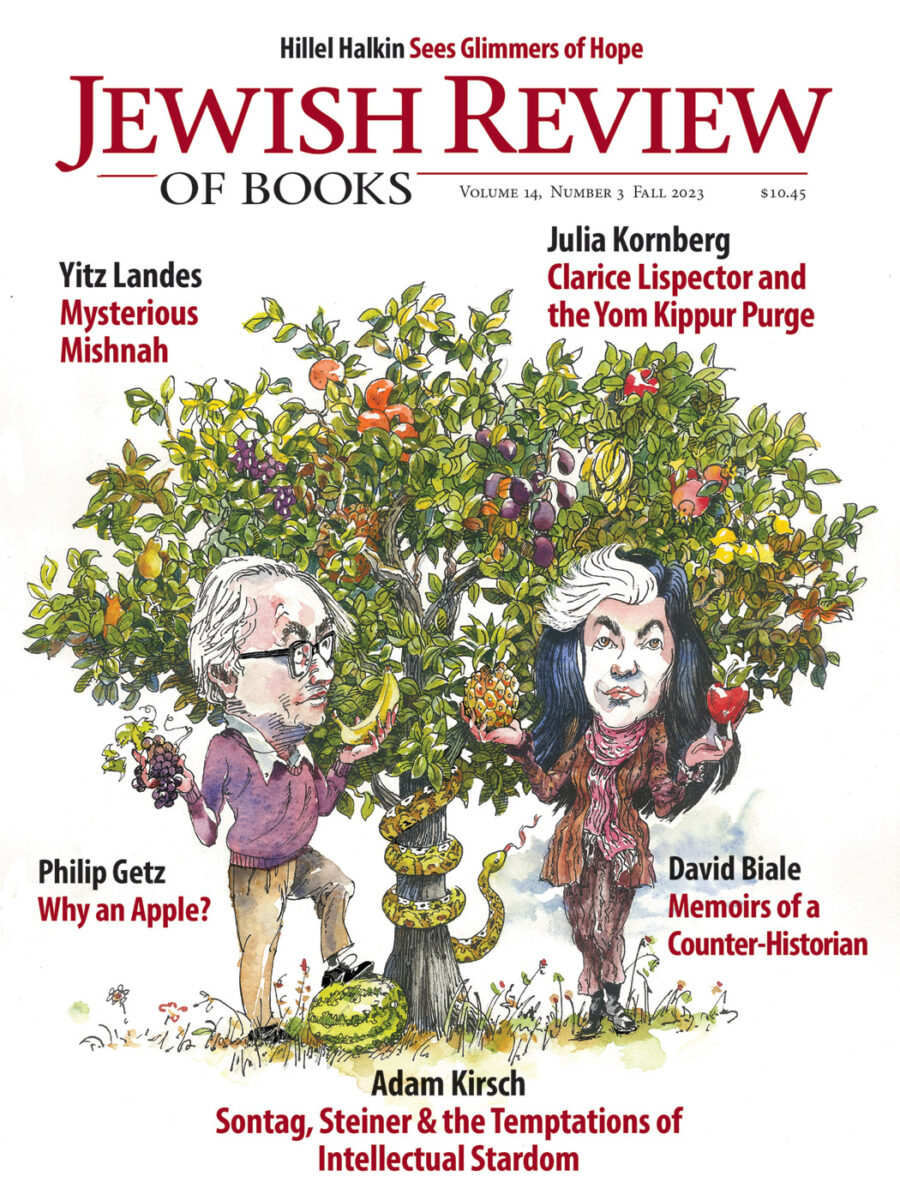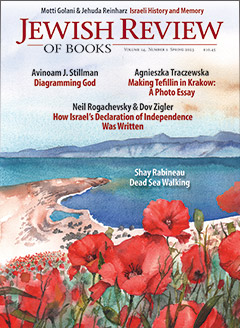Letters
Letters, Summer 2015
Otherwise than J, Internalized Guilt, Were Arendt and Herzl Wrong About France?, La Juive, Top Dog
Features
Israel’s Northern Border and the Chaos in Syria: A Symposium
Elliott Abrams, Itamar Rabinovich, Amos Yadlin
In the four-plus years since the Arab Spring, regimes have fallen, alliances have shifted and re-shifted, and new (and terrifying) actors have appeared on the scene. The diplomatic and strategic assumptions of several decades seem to have been upended. Nowhere is this more dramatically apparent than across Israel’s northern border. What, if anything, should Israel do about the Syrian crisis?
Reviews
Playing the Fool
Of the many varieties of anti-Semitism, or anti-Judaism, that have plagued the Jews over the centuries, two recurrent general patterns can be identified by the holidays that celebrate triumphs over them: Purim and Hanukkah.
Paradox or Pluralism?
Walzer’s paradox of liberation, if that is what it is, is that religion is back, or that despite the extraordinary success of secularizing revolutionaries it never quite went away.
Do You Want to Know a Secret?
“Who’s this guy,” asked one of my sister’s friends, “who writes about secret truths? I can’t remember his name.”
The Life of the Flying Aperçu
Dickstein’s story is not a narrative of apostasy and rebellion; belief and doctrine play a minor role.
Give Ear O Ye Heavens
Benjamin Harshav’s lifelong engagement in the forms of poetry has been a unique—and uniquely valuable—project.
Fanny and Hilde
If Court Jews provided economic services, the salon women provided cultural ones that were rarely available to rulers and other nobles in the stuffy environs of aristocratic society.
Tested Loyalties
What if a national leader chooses to bring disgrace on his family rather than compromise his political beliefs?
Everything Is PR
Peter Pomerantsev’s narrative of “the surreal heart of the new Russia” features pink heels, private helicopters, and fantastical Midsummer Night’s Dream parties with trapeze artists and synchronized swimmers dressed as mermaids.
Desk Pounding and Jewish Leadership
The trouble between Wise and Silver came to a head at the end of 1944, when Silver, over the Roosevelt administration’s objections, pressed for a congressional resolution endorsing Zionist aims—while Wise was quietly assuring the White House that he would do nothing for the resolution against the president’s wishes.
Readings
New Gleanings from an Old Book
Ruth, one of the shortest books in all of Tanakh, has a simple plot: A man from Bethlehem moves with his family to Moabite territory to ride out a famine in Judea, his two sons somewhat scandalously marry Moabite women, and all the men subsequently die.
A View from Reservoir Hill
A shul that never left the Old Jewish Neighborhood lives, volunteers, and prays through the recent crisis in Baltimore.
The Arts
The Great Gaon of Italian Art
Berenson’s teacher Charles Eliot Norton dismissively dubbed Berenson's method the “ear and toenail school,” but Berenson employed the technique in his first book to great effect.
An Al Schwimmer Production
When the ancient Spartans sought to aid a friendly state in distress, they did not send troops or arms or money.
Exchange
Strange Journey: A Response to Shmuel Trigano
Two historians challenge Shmuel Trigano’s analysis of anti-Semitic violence in France.
The View from Paris: A Rejoinder to Ethan Katz and Maud Mandel
The flaw Ethan B. Katz’s and Maud S. Mandel’s analysis of the position of Jews in France is that “they view the anti-Semitic violence we Jews are living through here in France through American-made binoculars,” says Shmuel Trigano.
Last Word
How the Baby Got Its Philtrum
The idea of learning as a recovery of what we once possessed is what makes Bogart’s bubbe mayse, and ours, so memorable: We can all touch that little hollow and feel the impress of forgotten knowledge.
Past Issues

Issue No. 56
Winter 2024

Issue No. 55
Fall 2023

Issue No. 54
Summer 2023

Issue No. 53